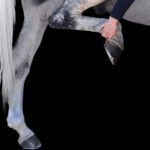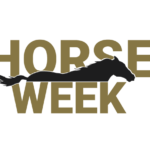September 16, 2002 — In Spain, where dressage is “doma” and eventing is “completo,” their word for endurance riding is “raid.”
And it really fit the way the field for the endurance competition at the World Equestrian Games set off at 7 this morning, in the dark and rain. A phalanx of riders, some with miners’ lights on their helmets, headed out as if they were on a raid, ready to conquer. But many of them were conquered instead by the conditions.
The ground that competitors originally feared would be rock-hard turned into a mire, a giant shoe-pulling machine that took a toll. The U.S. contingent felt the pain early, lost two individual riders and one team rider early, and then the team race, as France took the gold; Italy, the silver, and Australia the bronze.
Everything that leads up to the finish line in endurance is hard work, with little in the way of excitement. Horses are either blazing their way across the countryside, getting washed or being jogged for soundness, it seems. The views of the trotting and cantering horses aren’t even particularly pretty here. This is an unforgiving vista, with big stretches of brown unbroken by interesting scenic high points. The footing became slippery fast. John Crandall, a U.S. farrier, called it “a pig’s breakfast — slop.”
A Belgian rider who ran with his horse to give the animal a break found he could barely get his foot in the stirrup afterwards because his boots were so covered with mud. After he finally got on, he found he couldn’t get off, the mud had congealed in the stirrup and trapped him. Rather dangerous, I think.
But even with the rain, the situation suited the Australian-bred Bowman, the trim bay who took 16-year-old Sheikh Ahmed Bin Mohammed Al Maktoum of the United Arab Emirates to the world championship. Antonio Rosi, won the individual silver aboard Alex Raggio Di, and France’s Sunny Demedy earned the individual bronze on Fifi du Bagnas.
Asked if he pushed to catch the Arab, Rosi said he wasn’t up to snuff because he’d broken three toes on his left foot and his right leg in a fall a month ago. As a result, he was “heavy in the saddle” and not in a position where he could push his mount.
The UAE crowd mobbed the Sheikh as he crossed the finish line. There were so many people bouncing around and screaming with joy that it looked like the equestrian version of a soccer riot.
The Sheikh, the son of Dubai’s crown prince, had never competed before on his family’s bay gelding. It also was his first world championships outing. And here’s another first: prior to today, all the endurance world championships had been won by women.
The Sheikh seemed a little bewildered and just happy about winning, period, but he didn’t speak much. His older brother, Sheikh Rashid Bin Mohammed Al Maktoum, did most of the talking.
Despite their high-powered horses, however, the UAE team did not finish. Once it was obvious they wouldn’t make it as a team, Ahmed’s brothers and father, who were his teammates, said he should go for it himself.
The Emirates have been pouring money into the sport, hosting major competitions and angling to get it into the Olympics. I don’t see it happening; this is not a spectator sport. Sorry.
That was particularly the case under today’s mostly gray skies. It was also an endurance test for anyone who hung around past 9 p.m., waiting for the team results. Looking as bleak as the weather was America’s two-time world champion Valerie Kanavy, who was among the first casualties. She retired at the second crew point on the first loop when her horse, Shahdon, lost a shoe, then a protective boot and got stung on the rocky ground. That’s the short version of all the things that befell her today, but I won’t recount the details.
“It wasn’t my year. What can I say,” shrugged Val.
Pan American Championship winner Heather Bergantz Reynolds with Crystals Charm, better known as Red, lost a shoe as well on that loop and was finished. Team rider Kathy Brunjes’ horse, Ali Darkness, got mud under one of his pads and was pulled when the blockage caused him to limp.
That left three Americans, all team members, following chef d’equipe Art Priesz’s strategy that ran opposite to that of his counterparts in many other countries. While they had their riders take it easy on the long, tough second and fourth loops, he decided his team should make time there, and then recover on the easier third and last loops.
“On the third loop, we got smoked by the French, and a little bit by the Australians, too, and that’s where the Italians made their break,” said Art.
“We ride a different kind of ride at home most of the time, and that’s why we call it endurance riding, not endurance racing. The second and fourth loops were tough because of their footing and length (about 25 miles each), but he said, “those were the kind of long pulls they’d (the horses) be used to” and the thinking was that American horses would be able to recover quickly as a result.
But the footing was “treacherous” and many plans didn’t play out as they should today.
The Americans also have a different strategy long-term than do endurance participants in some other countries, Art told me.
“Over the course of a season, a horse that is consistently in the top 10 or the top five, winning races here and there, is considered a true endurance horse. Our riders are generally true amateurs, their horses are true partners. They want them to be there this year and two years from now.
“They want the horses to be with them like a favorite dog. In parts of the rest of the world, that’s true; in other parts of the rest of the world, that’s not true. Part of what we talk to our riders about is that we have a certain stewardship responsibility for the sport.”
Art said the reason there’s such a drive to improve completion rates for Americans, and some of those in other countries, is to show that “the horse is not a commodity. The horse is our partner and should be treated with that respect.”





